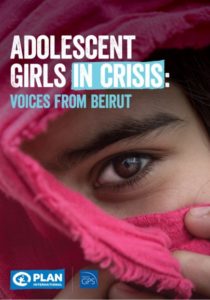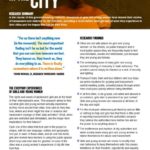News and Stories - Girls Rights - 18 June 2019
Adolescent Girls in Crisis: Voices from Beirut

The unique challenges faced by girls in crisis situations has been the basis of our Adolescent Girls in Crisis series, and a new report explores these challenges through an urban lens.
The fourth instalment in the series, Adolescent Girls in Crisis: Voices from Beirut is a joint report by Plan International and Monash University’s Gender, Peace and Security research centre, focussing on adolescent girls who are refugees in a city, particularly in the context of Lebanon.
Lebanon hosts the largest number of refugees per capita in the world, including a recent influx of 1.5 million fleeing the conflict in Syria as well as Palestinian families who have been in the country since 1949.
Based on surveys and group discussions with 400 girls between the ages of 10 and 19 in three locations in and around Beirut, the report explores the experiences of adolescent girls in these urban refugee communities, and elsewhere, and the unique and often overlooked impact that crisis has on their lives.
It seeks to amplify their voices and perceptions of their lives and communities, and presents their views on how the humanitarian sector might respond to the challenges they face.
The report found:
- More than half of girls surveyed said girls of their age face physical violence, sexual violence, sexual harassment and emotional or verbal abuse where they live.
- The primary concern of girls across all three sites and nationality groups was gender-based violence, including sexual harassment.
- Numerous girls spoke of being harassed or chased by men and boys, and some were concerned about being kidnapped or raped.
- Six per cent of girls surveyed reported being married, and four per cent were engaged.
- Some 69 per cent of girls said they felt unsafe travelling around the city alone during the day, while 87 per cent felt unsafe at night time.
- More than half of girls surveyed said that they feel isolated and lonely always, most of the time, or sometimes.
- School attendance plummets when girls reach 14 year old – 80 per cent of 10-14 year olds regularly attend school, compared to just 39 per cent of 15-19 year olds.
This report explores the experiences of adolescent girls within two age brackets – 10-14 and 15-19 years – navigating the urban spaces of Beirut in order to access services and opportunities.
This research was conducted with girls from both host (Lebanese) and refugee (including Syrian and Palestinian) communities.
Lebanon has shown hospitality in accepting large refugee populations, however, there has been significant strain on the infrastructure and resources available to support these already vulnerable groups and inter-communal tensions can arise when different populations live together in over-crowded areas.
This report focuses on adolescent refugee girls living in Beirut. It seeks to amplify their voices and perceptions of their lives and communities, and presents their views on how the humanitarian sector might respond to the challenges they face.



